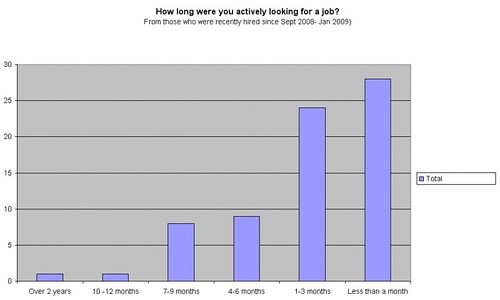This is part 2 of an ongoing community project to help people understand how to get jobs during a recession.
This data is slightly skewed towards those that are already active in social media as the survey went to those within my network on my blog and the highly connected Twitter community. There were 214 respondents to the survey although this graphic only represents those who got jobs since Sept 2008 (71 respondents) that represent those that were hired during the announcement of the recession. This sample set is smaller than one would expect out of a formal research project, after multiple promotions, it was capping out at 200 respondents, and I don’t have other resources to deploy against email lists, or affiliate programs. This is a personal research project, and is not tied to my employer, clients, or anyone else for that matter.
Finding 2: Most Recent Hires Got Jobs in Less Than 3 Months
This is just the data from the 71 respondents that got hired since Sept 2008 (since the recession started).
39% of the respondents who recently got a job were able to get a job within one of actively looking 33% of the respondents that recently got a job were able to do so within 1-3 months 12% shows a quick drop of respondents that recently were hired got a job 4-6 months of actively looking 11% of the respondents that recently got a job took 7-9 months of actively looking
This means that 72% of respondents were able to get a job within 3 months of actively starting to look.
Recommendations for Job Seekers in a Recession
Getting a job (for those who were hired from Sept 2008 to Jan 2009) haven’t had that much of a problem doing so For those that are concerned about layoffs, should have some ‘irons in the fire’ and keep conversations going with prospective empoyers Haven’t started a conversation? Be active by reaching out to your immediate network with your new skills, or projects, as shown by data from finding 1 Families and individuals should at least have 3 months (preferably 6 months, I’m told) of reserve capital for living expenses if someone gets laid off
To find the other results from this survey, I’ll be tagging the post “Job Survey” and you can click that category to learn more. I forgot to thank some folks with their ideas for questions for the survey such as Peter Kim, Bryan Person, Chris Kenton, and Charlene Li.
Coming soon I’ll be posting results for: top industries hired, compensation rates, and some other interesting data cuts.
Resources: See my Web Strategy Job Board

great post.
nice job.
[url= http://www.newera-hats.com] wholesale new era hats[/url]
sports shoes
Nike Sport Shoes
Women's Nike Sport Shoes
Men's Nike Sport Shoes